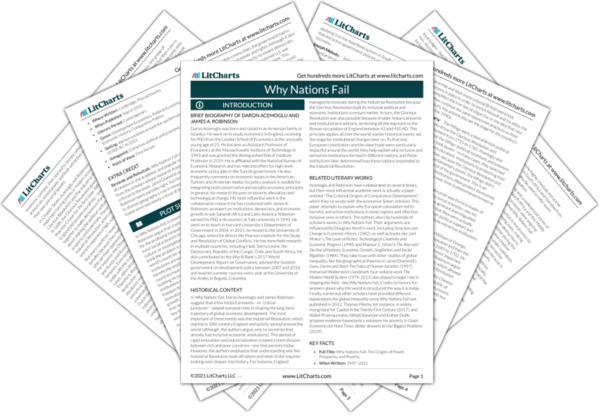Mao Zedong Quotes in Why Nations Fail
The divergent paths of English, French, and Spanish societies in the seventeenth century illustrate the importance of the interplay of small institutional differences with critical junctures. During critical junctures, a major event or confluence of factors disrupts the existing balance of political or economic power in a nation. These can affect only a single country, such as the death of Chairman Mao Zedong in 1976, which at first created a critical juncture only for Communist China. Often, however, critical junctures affect a whole set of societies, in the way that, for example, colonization and then decolonization affected most of the globe.

Unlock explanations and citation info for this and every other Why Nations Fail quote.
Plus so much more...
Get LitCharts A+The changes in economic institutions in China were radical. China broke the mold, even if it did not transform its political institutions. As in Botswana and the U.S. South, the crucial changes came during a critical juncture—in the case of China, following Mao’s death. They were also contingent, in fact highly contingent, as there was nothing inevitable about the Gang of Four losing the power struggle; and if they had not, China would not have experienced the sustained economic growth it has seen in the last thirty years. But the devastation and human suffering that the Great Leap Forward and the Cultural Revolution caused generated sufficient demand for change that Deng Xiaoping and his allies were able to win the political fight.

Mao Zedong Quotes in Why Nations Fail
The divergent paths of English, French, and Spanish societies in the seventeenth century illustrate the importance of the interplay of small institutional differences with critical junctures. During critical junctures, a major event or confluence of factors disrupts the existing balance of political or economic power in a nation. These can affect only a single country, such as the death of Chairman Mao Zedong in 1976, which at first created a critical juncture only for Communist China. Often, however, critical junctures affect a whole set of societies, in the way that, for example, colonization and then decolonization affected most of the globe.

Unlock explanations and citation info for this and every other Why Nations Fail quote.
Plus so much more...
Get LitCharts A+The changes in economic institutions in China were radical. China broke the mold, even if it did not transform its political institutions. As in Botswana and the U.S. South, the crucial changes came during a critical juncture—in the case of China, following Mao’s death. They were also contingent, in fact highly contingent, as there was nothing inevitable about the Gang of Four losing the power struggle; and if they had not, China would not have experienced the sustained economic growth it has seen in the last thirty years. But the devastation and human suffering that the Great Leap Forward and the Cultural Revolution caused generated sufficient demand for change that Deng Xiaoping and his allies were able to win the political fight.











